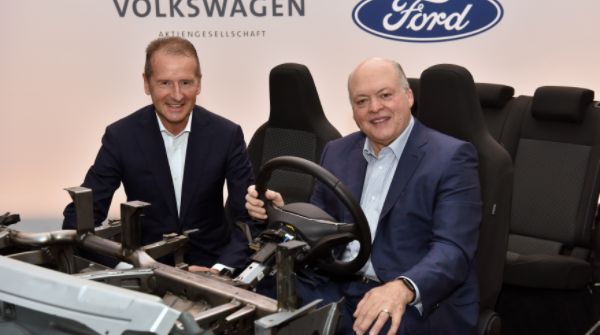Ford Motor Company and Volkswagen are expanding their global alliance to include electric vehicles, and will collaborate with Argo AI to introduce autonomous vehicle technology in the USA and Europe.
Argo AI’s self-driving system (SDS) is the first system worldwide scheduled for commercial deployment in Europe and the USA. Being able to tap into both auto makers’ global reach, Argo AI’s platform has the largest geographic deployment potential of any autonomous driving technology to date.
Volkswagen and Ford independently will integrate Argo AI’s SDS into purpose-built vehicles. Argo AI’s focus remains on delivering a SAE Level 4-capable SDS to be applied for ridesharing and goods delivery services in dense urban areas.
Ford and Volkswagen will have an equal stake in Argo AI, and combined, the two will own a substantial majority. The remainder will be used as an incentive pool for Argo AI employees.
“While Ford and Volkswagen remain independent and fiercely competitive in the marketplace, teaming up and working with Argo AI on this important technology allows us to deliver unmatched capability, scale and geographic reach,” Ford president and CEO Jim Hackett said. “Unlocking the synergies across a range of areas allows us to showcase the power of our global alliance in this era of smart vehicles for a smart world.”
Ford will also become the first additional OEM to use Volkswagen’s electric vehicle architecture and Modular Electric Toolkit (MEB) to deliver a high-volume zero-emission vehicle in Europe, starting in 2023.
Ford expects to produce more than 600,000 vehicles in Europe using the MEB architecture over six years, with a second all-new Ford model for European customers under discussion.
Meanwhile, Ford has plans to design an all-new, MEB-platform-based EV model, which will launch in 2023, in Köln-Merkenich, Germany. Volkswagen will supply MEB parts and components as part of the collaboration.
Both companies will continue to target additional areas where they can work together on electric vehicles.
Volkswagen CEO, Dr Herbert Diess, said, “Scaling our MEB drives down development costs for zero-emissions vehicles, allowing for a broader and faster global adoption of electric vehicles. This improves the positions of both companies through greater capital efficiency, further growth and improved competitiveness.”
The alliance, which covers collaborations outside of Volkswagen and Ford’s joint investments in Argo AI, does not entail cross-ownership between the two companies and is independent from the investment into Argo AI. The alliance is governed by a joint committee, which is led by Hackett and Diess and includes senior executives from both companies.
Volkswagen will invest US$2.6bn in Argo AI by committing US$1bn in funding and contributing its US$1.6bn Autonomous Intelligent Driving (AID) company, which includes more than 200 employees – most of whom have been developing self-driving technology for the Volkswagen Group.
As part of the transaction, Volkswagen also will purchase Argo AI shares from Ford for US$500m over three years. Ford will invest the remaining US$600m of its previously announced US$1bn cash commitment in Argo AI.
The full transaction represents a valuation for Argo AI that totals more than US$7bn.
“Argo AI is fortunate to have a world-class team due to our clear mission and the commitment to deployment from our partners, and together with AID employees, we will have a global workforce to attract even more of the best talent,” said Bryan Salesky, co-founder of Argo AI. “Plus, thanks to Ford and Volkswagen, Argo AI technology could one day reach nearly every market in North America and Europe, applied across multiple brands and to a multitude of vehicle architectures.”
Based in Munich, Germany, AID will become Argo AI’s new European headquarters and will be led by AID’s current CEO Karlheinz Wurm. With the addition of AID employees, Argo AI will grow from 500 to over 700 employees globally.
Argo AI is also testing its technology jointly with Ford in Miami and Washington, DC, where together they plan to launch a new range of commercial services.


